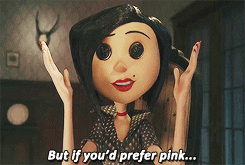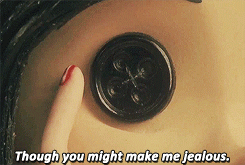seperis:elfwreck:roach-works:neil-gaiman:feyariel:petrichormeraki:hematite2:whatpunkin:porcelainandg
seperis:elfwreck:roach-works:neil-gaiman:feyariel:petrichormeraki:hematite2:whatpunkin:porcelainandgold:tripster-and-the-mad-hatter:glossynympheteyes:this movie is so fucking creepy jesus fuckIt’s by Tim Burton, what did you honestly expect?Actually, it’s Henry Selick, who was the director of The Nightmare Before Christmas. The book was written by Neil Gaiman, though, and is far…far….worse.Sorry, I’m about to geek the hell out.The movie is captivating, but the book is twenty kinds of terrifying, even now, ten years after I first read it. As disturbing as the movie may have been to some, the things Selick added really serve to cushion just how horrific the story really is.First of all, the character of Wybie does not exist in the book. Coraline is facing all of this nearly alone, with her only help coming from the sly comments of the cat, a warning from the circus mice, and the stone given to her by her neighbor, presented with no comment but that it “makes the unseen seen.”Second, the Other Parents are never quite as warm (and, dare I say, normal) as they are in the gifs above. They’re described as having paper-white skin and the Other Mother’s hair is said to move on its own, and her long, red, claw-like nails don’t ease any uncertainty that she is absolutely, positively up to no good. The first time Coraline meets them, they (and the rest of the Others) seem to be playing roles (for whatever reason, Coraline does not seem to pick up on this), like they all know what to say and what to do and are simply waiting for Coraline to make her move in their terrifying play world. This is shown to be partly true when the Other Parents tell her they know she’ll be back soon after she refuses the buttons - this time, to stay.Third, the Other Mother commits atrocities that really should not have been in a book for anyone not fully grown up. She physically deforms the world around Coraline to slow her progress in their game beyond any mild traps the movie portrays, and, instead of turning the Other Father into the wandering pumpkin-thing seen in the film, she simply ceases to use him and throws his body away in the cellar, leaving him to rot with whatever bit of sentience he has left. She begins to lose her touch, as Coraline gains the upper hand. Her world doesn’t just become a nightmare - it falls apart completely. No creepy but oddly cool bug furniture here, just the house that now appears to be a child’s drawing. Whatever the Other Mother is (a beldame, but something tells me she’s much more ancient and powerful than that), she does not give half a hump about what she has to do to ensnare Coraline. Destroy the supporting characters of her twisted creation? Done. Allow herself to be dismembered to ruin Coraline’s life in the normal world? Not even gonna bat an eyelash.On a final, personal note, imagine eight year-old me, ignored by my parents, absorbed in the story and identifying with Coraline from the start. Imagine me finishing this bloodcurdling book and immediately thinking of my basement, where there is still a locked door that my grandmother swears up and down is nothing more than a storage room, but has not once in my (or my mother’s) lifetime unlocked.Can you see why this book still scares me?Fun fact I learned from seeing neil gaiman speak: when he first wanted the book published, his editor said it was too scary. He suggested she read it to her young daughter, and then decide. So she did, and her daughter wasn’t afraid, and it was published. Years later, Gaiman was sitting next to that daughter at an event and told her this story, and she said “oh I was terrified I just didn’t want to tell my mom”. Coraline WAS too scary to be published, but exists anyway because a girl lied to her mother.@neil-gaiman, is this true about the publisher’s daughter?It was my literary agent, Merrilee Heifetz who read it and said “you can’t seriously expect this to be published as a children’s book.” So I suggested she read it to her daughters. And she called me back a week later and said “They love it and they weren’t scared at all. I’ll take it to Harper Children’s.”A decade later, at the Opening Night of the Coraline musical, I was sitting next to Morgan, Merilee’s youngest daughter, and told her how her not being scared had made the book happen. And she said “I was terrified. But I needed to find out what happened next. So nobody knew.”So, yes.Children need access to terrifying and horrifying stories in which kids their age are the heroes. It’s healthy for kids to experience fear and horror and revulsion and disgust in fiction, because then they can learn on their own terms and in their own time how to handle those emotions. People who are kept away from scary stories when they’re young aren’t actually any better equipped to experience them for the first time when they’re adults: they’re actually going to be way more brittle. Scary stories are very functionally vaccines against real horrors.Coraline is an excellent children’s story, not because it’s not gruesome and dark and twisted and revolting and existentially horrifying and full of all sorts of haunting little atrocities, but because it is all those things, and magnificently so. “Fairy tales do not tell children the dragons exist. Children already know that dragons exist. Fairy tales tell children the dragons can be killed.”― G.K. ChestertonI agree with this but with anecdata: my parents weren’t at all unreasonably restrictive on what i watched or read, and they were sensible in my access to horror. As it turns out, however, that may have been a mistake; the first time I watched Friday the Thirteenth I was around fourth grade with others of my age and–suffice to say, my reaction was dramatic, even compared to my peers. This continued throughout the age of slumber parties and adolescence; literally could not deal. My senior year, feeling adult, me and some friends rented Candyman.I did not make it past the bathroom and narrator. Twenty eight, I re-tested with The Ring; I clung in with the plotline, but the end with the tv and the ex? Noped out but breathtaking progress as far as I was concerned, I watched the movie. All I needed were pillows, blankets, several other people, and an easily accessible escape route. I literally surprised myself there.Literature was different. I did fairly quickly get into reading it by age eleven/twelve–I was a reader, motivated, and my parents loved Stephen King so he was the most easily accessible–but I process the written word far better than anything and also, when I was done, the sense of it being real faded, which is much harder with visual anything. Even so, horror haunts me, persistently, and it sticks hard. I still don’t deal well with fear, even normal fear, even normal adult fear, and maybe it’s unrelated, but maybe it’s not.This could be very much my personality, but with Child, I did it differently because that shit is embarrassing for a kid and being male, social expectations among peers include encyclopedic knowledge of popular horror. It helped that there was a lot more horror meant for kids available, but when he showed interest in horror movies and books beyond that, my only criteria was avoiding gore and violence porn and stick to the ones with a working plot with minimal rape and violence porn. Friday the Thirteenth, Nightmare on Elm Street, Halloween (now I can sit through all those), Hellraiser, Texas Chainsaw Massacre, no goddamn Hostel bullshit. Child’s in his twenties, and his only hard nope, believe it or not, was the television version of It, which is one of the few movies I could sit through.(Like, the one thing I got out of this is that I am the equivalent of stoned off my ass after I ride a really good rollercoaster, which is great (seriously) but there just aren’t enough rollercoasters in daily life to really justify the trade. You’d think this would translate to some kind of climbing-related hobby; it really does not.)Child way less high-strung than I am; growing up, fear didn’t just overwhelm him for weeks like it did me when something genuinely scared him; he grew out of being afraid of the dark, which I cannot say I have reliably managed; the unknown as concept is not a source of terror, things don’t stick like they do with me where fear seems to stalk me until I can finally burn it out. There are probably a thousand reasons he’s not nearly as nervous and high-strung as I am that come down to genetics, personality, sex, sexuality, gender luck of the draw, random, and correlation doesn’t equal causation, but I can’t help but think it may be related to how he reacts to the unknown even an adult with ‘what is it’ whereas my reaction is ‘it’ll probably kill me’ which I mean metaphorically but do not rule out some amount of literalism.I am not encouraging anyone to show their five year old the top ten horror movies of all time, but introducing them to horror is a responsibility of parenthood because fear is ubiquitous to being human and they have to learn to deal with it. Do it age appropriately but more importantly, child-appropriately; how to deal with fear is a mandatory life lesson, and childhood is the only time they get to learn how to deal with it in controlled conditions when the stakes are low. They also learn something hard even for adults: fear, being afraid, is not always bad. Sometimes, it can be fun; there are rollercoasters out there waiting to be riddenThe skills a kid learns dealing with their fear of the imaginary boogeyman in the closet are identical to those needed when the boogeyman is very, very real. I teach a horror writing class for middle schoolers. My students are all age 10 to 14 (I’ve even had one precocious 9 year old). This is by far my most popular class. It’s by far the class that produces the longest, most complex, COMPLETED works. Children are scary. They understand scary things in a pure way, uncomplicated by adult notions of what should be scary. They get right to the core of it without the fluff or the need to always make everything symbolic, but when they do ascribe symbolism, it’s always weird and really fun because they haven’t yet learned adult writers have a kind of shared expectation about symbolism. tl;dr kids are fucking scary in the best possible way, so just embrace that. -- source link





